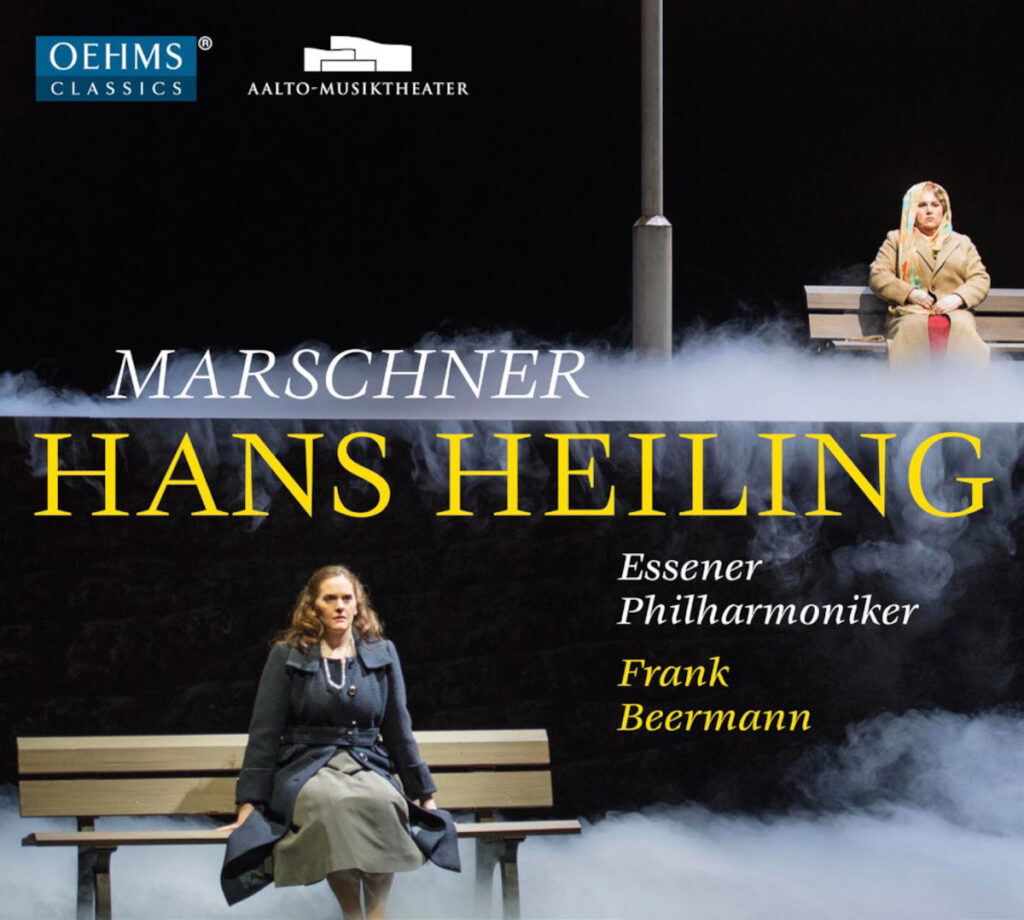Heinrich Marschner (1795-1861) was one of many nineteenth-century composers in the German-speaking lands who tried to create a tradition of serious German opera, distinct from tradition of Singspiel (mostly light comic operas with acres of spoken dialogue). Others included Spohr, Weber (Euryanthe), Franz Lachner, and Max Bruch. Wagner, of course, sealed the deal, from Flying Dutchman onward.
Four Marschner operas have received a fair number of performances and even been recorded (I’ll translate): The Vampire, The Templar Knight and the Jewish Woman, The Wood Thief, and, his best-known work, Hans Heiling (1833). Hans Heiling received a new recording in February 2018, and I’m pleased to give it some (belated—my apologies!) attention here.
Like most of Marschner’s operas, and indeed like so many serious German operas of the era, Hans Heiling deals with a mix of legend, concrete historical context, and the supernatural. Marschner showed the opera, while working it out, to Mendelssohn, who encouraged him. Indeed, much of the music sounds like what Mendelssohn or some other stylistic conservative would have written at the time. The harmonic language is often clear, with little chromatic mystery, despite the active participation of supernatural Earth Spirits who live and conspire underground against humans above. The strangest and most powerful moments come in two scenes of melodrama (in the technical sense, meaning spoken dialogue alternating with or layered on top of music for orchestra or for chorus and orchestra). No surprise, these are both for subterranean characters: Hans Heiling and his mother, the Queen of the Earth Spirits.

There are moments of great tunefulness, expertly written for the voice. A sweeping tune in the finale is close to Violetta’s big tune “Amami, Alfredo!”, though Verdi wouldn’t compose that opera for another twenty years. Some lines for the two main male roles (Hans and Konrad) sound eerily Wagnerian, though Wagner was only 20 when Hans Heiling was first produced in Berlin.
The chorus participates actively, taking several different roles. And the orchestra, as one might expect from a German opera of this era, intervenes actively, sometimes creating a background tapestry against which the voices declaim relatively conversational (rather than frankly tuneful) lines. If the latter sounds like a description of the texture of the Ring Cycle, well, you’re probably right. Wagner had his ears open to all kinds of innovations and techniques in the works of his day.
My positive reaction is surely conditioned by the excellence of the performance here. Best of all is the soprano Jessica Muirhead. Her tone is liquid and pure, utterly appropriate for the unsullied Anna, upon whom the Earth Spirit Hans Heiling (who has taken the form of a man) has designs. The other singers are varying degrees of highly capable, some of them showing a wobble on long notes. Baritone Jeffrey Dowd, as Anna’s devoted earthly lover Konrad, displays rounded tone but occasionally is just a bit under pitch. (The recording comes from stage performances.) Tenor Heiko Trinsinger, as the title character, has a leathery voice but sings intensely and manically, sounding very much like the dangerous, deranged creature that the libretto portrays. It’s fun to have an opera where the tenor is so repulsive and the baritone, for once, deserves the virtuous maiden and ends up with her. All the singers (whether German- or American-born) enunciate the German text with splendid clarity. The Essen orchestra and chorus perform with much zest and nuance.
I have not heard the recording conducted by Korner and nor that of Keilberth (with one of my favorite baritones, Hermann Prey). But I cannot imagine that they give a better all-around sense of Marschner’s achievement and likely influence than this splendid new recording. If you love the Dungeon Scene in Fidelio or the Wolf’s Glen Scene in Der Freischütz, you gotta hear what Marschner does with melodrama!
Libretto in German only. With luck you may find a workable translation of the libretto online. Warning: some lines (for Gertrude, Anna’s mother) that are given in the original High German in the booklet are done in dialect in this production.
The booklet-essay, by the production’s stage director, gives full background on the history of the work and sources of its rather bizarre libretto but says next to nothing about Marschner’s remarkable and admirable musical responses to that libretto, nor does it indicate what cuts or other changes were made in the production.
Ralph P. Locke
Hans Heiling
Composed by Heinrich Marschner
Libretto by Eduard Devrient
Jessica Muirhead (Anna), Rebecca Teem (Queen of the Earth Spirits), Bettina Ranch (Gertrude), Heiko Trinsinger (Hans Heiling), Jeffrey Dowd (Konrad).
Essen Philharmonic, Bergwerksorchester Consolidation (the Consolidation Miners’ Orchestra), and Aalto Theater Opera Chorus, cond. Frank Beermann.
Oehms 976 [2 CDs] 140 minutes.
To order or to try any track, click here.
Ralph P. Locke is emeritus professor of musicology at the University of Rochester’s Eastman School of Music and Senior Editor of the Eastman Studies in Music book series (University of Rochester Press), which has published over 200 titles over the past thirty years. Six of his articles have won the ASCAP-Deems Taylor Award for excellence in writing about music. His most recent two books are Musical Exoticism: Images and Reflections and Music and the Exotic from the Renaissance to Mozart (both Cambridge University Press). Both are now available in paperback; the second, also as an e-book. Locke also contributes to American Record Guide and to the online arts-magazines New York Arts, Opera Today, The Boston Musical Intelligencer, and Classical Voice North America (the journal of the Music Critics Association of North America). His articles have appeared in major scholarly journals, in Oxford Music Online (Grove Dictionary), and in the program books of major opera houses, e.g., Santa Fe (New Mexico), Wexford (Ireland), Glyndebourne, Covent Garden, and the Bavarian State Opera (Munich). The present review first appeared in American Record Guide and is included here, lightly revised, by kind permission.